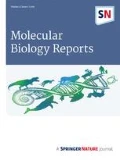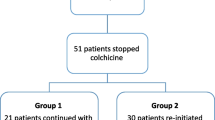Abstract
Familial Mediterranean fever is a hereditary autoinflammatory syndrome. The typical treatment for the disease is colchicine. However, a subset of patients are not responsive to colchicine. In this study, polymorphisms in the colchicine-binding site of the TUBB1 gene, which encodes a tubulin isoform specific to leukocytes, were investigated in patients with colchicine-resistant disease. FMF patients who were followed in the Department of Pediatric Rheumatology at Hacettepe University were included in this study. Colchicine resistance was defined as ongoing disease activity (≥ 1 attack/month over 3 months or persistently elevated CRP) while taking the maximum tolerated dose of colchicine. A total of 62 Turkish FMF patients (42 colchicine-responsive and 20 colchicine-resistant) and a control group of healthy children were included in the study. DNA was extracted for analysis of TUBB1, and the colchicine binding site was sequenced. We did not observe A248T (rs148237574) or M257V (rs759579888), two variations that were previously associated with colchicine resistance in an in silico analysis. We did detect T274M (rs35565630), R306H (rs772479017), and R307H (rs6070697) variants in the FMF patients, but there was no statistically significant difference between the colchicine-responsive and colchicine-resistant groups. This is the first study to evaluate TUBB1 gene polymorphisms in the colchicine binding site in patients with FMF. Our data do not support the hypothesis that these polymorphisms are a possible cause of colchicine resistance in FMF patients.

Similar content being viewed by others
References
Orphanet: Familial Mediterranean Fever. https://www.orpha.net/consor/cgi-bin/OC_Exp.php?lng=en&Expert=342. Accessed 6 Feb 2020
Ece A, Çakmak E, Uluca Ü, Kelekci S, Yolbas I, Gunes A et al (2014) The MEFV mutations and their clinical correlations in children with familial Mediterranean fever in southeast Turkey. Rheumatol Int 34:207–212. https://doi.org/10.1007/s00296-013-2858-1
Infevers - Tabular list. https://infevers.umai-montpellier.fr/web/search.php?n=1. Accessed 6 Feb 2020
Akbaba TH (2019) Investigation of inflammasome components during cell migration process in autoinflammatory diseases. Thesis, Hacettepe University
Goldfinger SE (1972) Colchicine for familial Mediterranean fever. N Engl J Med 287:1302
Slobodnick A, Shah B, Krasnokutsky S, Pillinger MH (2017) Update on colchicine. Rheumatology 57:i4–i11. https://doi.org/10.1093/rheumatology/kex453
Park YH, Wood G, Kastner DL, Chae JJ (2016) Pyrin inflammasome activation and RhoA signaling in the autoinflammatory diseases FMF and HIDS. Nat Immunol 17:914–921. https://doi.org/10.1038/ni.3457
Krendel M, Zenke FT, Bokoch GM (2002) Nucleotide exchange factor GEF-H1 mediates cross-talk between microtubules and the actin cytoskeleton. Nat Cell Biol 4:294–301. https://doi.org/10.1038/ncb773
Livneh A, Zemer D, Langevitz P, Shemer J, Sohar E, Pras M (1993) Colchicine in the treatment of AA and AL amyloidosis. Semin Arthritis Rheum 23:206–214. https://doi.org/10.1016/s0049-0172(05)80042-3
Ozen S, Kone-Paut I, Gül A (2017) Colchicine resistance and intolerance in familial Mediterranean fever: definition, causes, and alternative treatments. Semin Arthritis Rheum 47:115–120
Lidar M, Yonath H, Shechter N, Sikron F, Sadetzki S, Langevitz P et al (2012) Incomplete response to colchicine in M694V homozygote FMF patients. Autoimmun Rev 12:72–76
Ozen F, Silan C, Uludag A, Candan F, Silan F, Ozdemir S et al (2011) Association between ABCB1 (MDR1) gene 3435 C > T polymorphism and colchicine unresponsiveness of FMF Patients. Ren Fail 33:899–903. https://doi.org/10.3109/0886022X.2011.605980
Sahakyan H, Abelyan N, Arakelov V, Arakelov G, Nazaryan K (2019) In silico study of colchicine resistance molecular mechanisms caused by tubulin structural polymorphism. PLoS ONE. https://doi.org/10.1371/journal.pone.0221532
Prota AE, Danel F, Bachmann F, Bargsten K, Buey RM, Pohlmann J et al (2014) The novel microtubule-destabilizing drug BAL27862 binds to the colchicine site of tubulin with distinct effects on microtubule organization. J Mol Biol 426:1848–1860. https://doi.org/10.1016/j.jmb.2014.02.005
Lu Y, Chen J, Xiao M, Li W, Miller DD (2012) An overview of tubulin inhibitors that interact with the colchicine binding site. Pharm Res 29:2943–2971
Ravelli RBG, Gigant B, Curmi PA, Jourdain I, Lachkar S, Sobel A et al (2004) Insight into tubulin regulation from a complex with colchicine and a stathmin-like domain. Nature 428:198–202. https://doi.org/10.1038/nature02393
Gattorno M, Hofer M, Federici S, Vanoni F, Bovis F, Aksentijevich I et al (2019) Classification criteria for autoinflammatory recurrent fevers. Ann Rheum Dis 78:1025–1032. https://doi.org/10.1136/annrheumdis-2019-215048
Yalçinkaya F, Ozen S, Ozçakar ZB, Aktay N, Cakar N, Düzova A et al (2009) A new set of criteria for the diagnosis of familial Mediterranean fever in childhood. Rheumatology 48:395–398. https://doi.org/10.1093/rheumatology/ken509
Demirkaya E, Acikel C, Hashkes P, Gattorno M, Gul A, Ozdogan H et al (2016) Development and initial validation of international severity scoring system for familial Mediterranean fever (ISSF). Ann Rheum Dis 75(6):1051–1056. https://doi.org/10.1136/annrheumdis-2015-208671
Leandro-García LJ, Leskelä S, Inglada-Pérez L, Landa I, de Cubas AA, Maliszewska A et al (2012) Hematologic β-tubulin VI isoform exhibits genetic variability that influences paclitaxel toxicity. Cancer Res 72:4744–4752. https://doi.org/10.1158/0008-5472.CAN-11-2861
Giannakis M, Mu XJ, Shukla SA, Qian ZR, Cohen O, Nishihara R et al (2016) Genomic correlates of immune-cell infiltrates in colorectal carcinoma. Cell Rep 15:857–865. https://doi.org/10.1016/j.celrep.2016.03.075
Basciano PA, Matakas J, Pecci A, Civaschi E, Cagioni C, Bompiani N et al (2015) β-1 Tubulin R307H SNP alters microtubule dynamics and affects severity of a hereditary thrombocytopenia. J Thromb Haemost 13:651–659. https://doi.org/10.1111/jth.12824
Balci-Peynircioglu B, Akkaya-Ulum YZ, Akbaba TH, Tavukcuoglu Z (2019) Potential of miRNAs to predict and treat inflammation from the perspective of familial Mediterranean fever. Inflamm Res 68:905–913
Akbaba TH, Balcı-Peynircioğlu B (2018) Potential impacts of gut microbiota on immune system related diseases: current studies and future challenges. Acta Med 49:31–37
Acknowledgements
Advanced English Language editing service was supplied by Hacettepe Teknokent Technology Transfer Center (HT-TTM).
Funding
This study was supported by the Scientific and Technological Research Council of Turkey (TÜBİTAK, Project Number: 218S522).
Author information
Authors and Affiliations
Contributions
THA and BBP designed and drafted the work; MK and SO determined the study groups and analyzed the clinical information; THA and GU performed the experiments; THA and MC wrote the manuscript; and BBP and SO finalized the manuscript for submission. All authors have read and approved the final manuscript.
Corresponding author
Ethics declarations
Conflicts of interest
The authors declare that they have no conflict of interest.
Consent for publication
All authors agree on publishing.
Ethics approval
The study was approved by the Non-interventional Clinical Research Ethics Board of Hacettepe University (2020/01-40). Written informed consent was obtained from all patients and their parents.
Additional information
Publisher's Note
Springer Nature remains neutral with regard to jurisdictional claims in published maps and institutional affiliations.
Electronic supplementary material
Below is the link to the electronic supplementary material.
11033_2020_5957_MOESM1_ESM.tif
Supplementary material 1 (TIF 69 kb) Figure S1: Agarose gel image of the PCR products of a fragment encoding the colchicine-binding site of TUBB1 in FMF patients and control individuals. (S: severe FMF patients, M: mild FMF patients, C: control, NTC: no template control)
11033_2020_5957_MOESM2_ESM.docx
Supplementary material 2 (DOCX 13 kb) Table S1. Chi-square analysis (χ2) of the R307H polymorphism between the FMF patient and control groups.
Rights and permissions
About this article
Cite this article
Akbaba, T.H., Ustabas, G., Kasap-Cuceloglu, M. et al. Analysis of polymorphisms in the colchicine binding site of tubulin in colchicine-resistant familial Mediterranean fever patients. Mol Biol Rep 47, 9005–9011 (2020). https://doi.org/10.1007/s11033-020-05957-8
Received:
Accepted:
Published:
Issue Date:
DOI: https://doi.org/10.1007/s11033-020-05957-8




